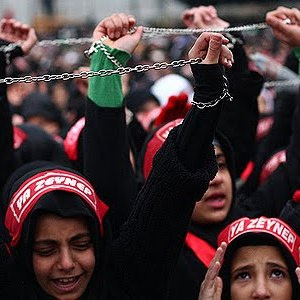A Sunni among Shi’as

For five centuries the Ottoman Turks led the Sunni World, with their emperors considering themselves successors to the early Muslim caliphs. The collapse of the Ottoman Empire at the end of the First World War and the rise of a Turkish republic from its ruins not only put an end to this era, but also ushered in an age of anti-religion secular political rule. For nearly eight decades, the Republic of Turkey viewed Islam as a threat and followed an unshakable campaign against its influence on the domestic stage. Revival of pan-Islamism was considered as a threat deserving of merciless suppression. On a deeper level, however, power remained in the hands of the Sunni majority during these de-religion-ized years, with the minority Shi’a and Alevi sects still feeling the pressure of the State. The Tunceli (1938), Kahramanmaras (1978) and Sivas (1993) massacres against Alevis, the first one carried out by the military and the other two conducted by religious extremists, occurred during the reign of a secular regime. Nevertheless, during the rule of the Islamist AK Party in Turkey, particularly during its second term, the mood seems to be changing. During recent years—under the leadership of Recep Tayyip Erdogan—the Turkish government has adopted a more democratic approach toward the definition of its domestic and foreign policies. The state of Shi’as and Alevis in Sunni-dominated Turkey was one of the problems requiring a change of tack. The unprecedented participation of the Turkish PM—along with some members of his cabinet—in an Ashoura ceremony this year (held annually in Istanbul’s Halkali Square) is indeed a significant shift and a product of this democratic approach. On a deeper level, however, Erdogan’s move is part of Turkey’s macro-strategy that aims at resolving social conflicts involving minority groups such as the Kurds, besides the Shi’as and Alevis of the country. In Turkey’s new approach, a redefinition of domestic and foreign policies has turned into a central concern. A changing Turkey cannot stick to its traditional attitude toward religious minorities. Shi’as may not be a considerable majority in Turkey; however, their shared roots with Alevis (a unique sect of the Shi’a denomination) and their likely synergic social and political influence –they form one-third of the country’s population- is not something the government would particularly enjoy. A democratic approach that opens up the political, social and religious atmosphere will revive many suppressed demands (there have been demands for calling off Ashoura in Turkey, an objective likely attainable). Erdogan’s –and the government’s in general- involvement at this juncture is quite meaningful and could actually sustain the state’s control over demands suppressed or denied for centuries. At times, even the demands put forward in the name of Shi’as and Alevis are rejected as they are believed to be unrealistic ones ultimately aimed to assimilate the minority. All in all, Erdogan’s current approach toward ethnic and religious minorities can be both an opportunity and a threat. The ultimate success of this approach is contingent upon on the honesty of all parties involved, particularly Erdogan who is on the powerful side of the equation. The Turkish PM speaks of the injustice inflicted upon Imam Hussein and the Household of the Prophet, while mosques built and belonging to Shi’as are forcibly under the supervision of the state-run Presidency of Religious Affairs. Preachers of the mosques are also largely designated by the Presidency, while religious minorities have no representatives in the organization. Shi’a and Alevi citizens are also frustrated with the fact that their taxes are not spent on their religious concerns. One could look at Erdogan’s gesture more positively however, knowing that the Turkish PM himself was once a victim of political and religious pressures inside his own country during the time of the secularists’ rule. Time is the best arbiter of the intentions of Erdogan. Regarding the temporal and political situations of the age, it is highly unlikely that any hidden agenda behind the Turkish government’s move could succeed. But a proven honesty would be another pressure tool over regional states still suppressing ethnic and religious minorities.

